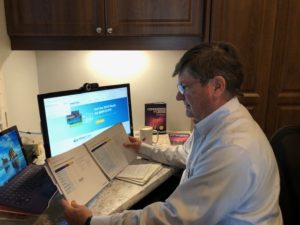By Stephen Tweed
The past two weeks have rocked our world, as most of the world we know has shut down as a result of Covid-19.
One bright spot in this world-wide crisis is that home care companies across the US are continuing to serve their clients. As members of our Home Care CEO Mastermind Groups have been meeting online to share ideas, solve problems, and support one another, we are learning how these top tier home care companies are Coping with Covid.
Protecting Clients and Caregivers
The biggest challenge during this crisis is protecting our clients and our caregivers. As one Mastermind Member said, “My biggest fear is infecting a client from a caregiver.”
Here’s what some companies are doing:
- Providing re-training to caregivers on Infection Control practices
- Providing masks, gloves, and other Personal Protective Equipment
- Developed a Virtual Case Management Protocol for care management
- Have caregivers on-call each shift to cover call offs
- We shifted our schedule so that each caregiver has only one client, and each client has only one caregiver.
- We are accepting only live-in cases with one-to-one care
- Doing daily screening of caregivers with structured questions and taking temperature
Coping with the shortage of Personal Protective Equipment
Everyone is experiencing the shortage of Personal Protective Equipment for caregivers. Here are some solutions:
- We already supplied gloves and masks. Our regular vendor is continuing to fill our orders.
- We are working with a local manufacturer of outdoor cushions to make masks from their stock of fabric.
- Several home care companies are working together to place large orders for PPE.
We are continuing to research sources for PPE, so stay tuned for future articles.
Operating your Agency Remotely
Nearly every agency we know is now having their staff work from home. Here are some things they are doing or have done to make this work:
- With multiple offices, we were already set up with Voice over Internet phone systems, and laptops
- We wrote an Essential Worker letter using the HCAOA sample
- We are sending BombBomb videos to our caregivers, and to our office team
- Daily stand up video meeting with office team who are working remotely
Recruiting, Interviewing, and On- Boarding Remotely
Most agencies are continuing to recruit caregivers, and are interviewing and on-boarding remotely. Here are some of the things they are doing:
- We are continuing to recruit online. We screen applicants by phone, and then do interviews by video. After a hiring decision, we use a digital signing system to complete the hiring paperwork. New Employee Orientation is by video. We’re a bit nervous about not being able to do our regular skills checks.
- We have paperless on-boarding through our payroll company.
- We are only hiring CNA’s with a minimum of 2 year’s experience.
- We are raising our standards, and holding people accountable. We are pruning off the bottom performers
Three New Laws to Cope with Covid-19
Congress has passed and The President has signed into law three acts to address the Covid-19 crisis. We are researching these new laws and will provide summary information for you as it become available. The laws are:
- The Coronavirus Preparedness and Response Supplemental Appropriation – March 6, 2020
- The Families First Coronoavirus Response Act – March 18-2020
- The Coronavirus Aid, Relief, and Economic Security Act – (Cares Act) – March 27, 2020
Office Hours with Stephen Tweed 
To bring you more timely updates on how the home care industry is coping with Covid-19, we will be starting a new service called “Office Hours with Stephen Tweed”. This will be a weekly live video conference where will will share the latest information and take questions from participants. The first session of Office Hours with Stephen Tweed will be Thursday, April 2, 2020 at 4:00 pm eastern time. We’ll continue with this weekly question and answer discussion as long as their are home care leaders who have questions. To participate, you will need to register, and the online meeting room is limited to the first 100 participants.




